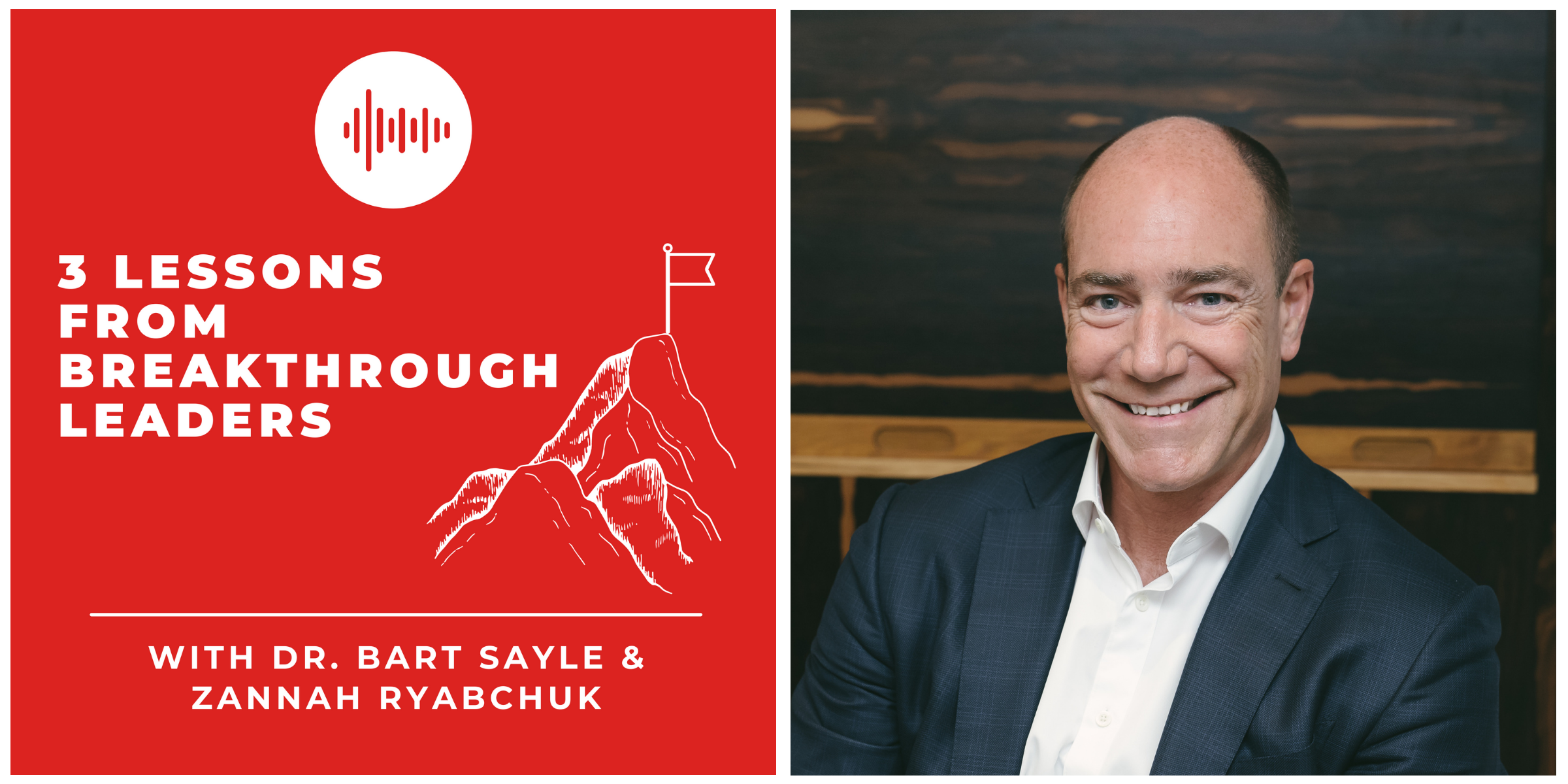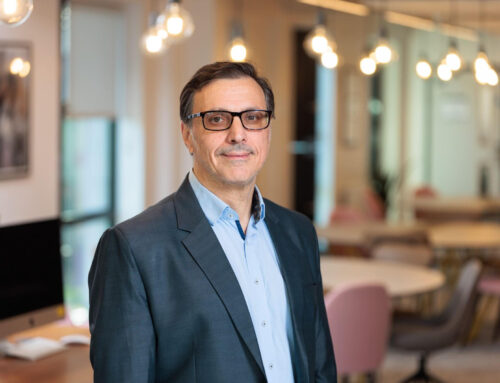
Our 8th podcast episode with Paul Cuatrecasas is live! Paul talks about the importance of digitisation in organisations and how to retain talent.
Paul is the Founder and CEO of Aquaa Partners, a M&A and strategic advisory firm and the author of ‘Go Tech or Go Extinct’. Paul has been quoted in The Washington Post, The Los Angeles Times, US News & World Report, and Forbes. Learn more about Paul here.
You can buy Paul’s book ‘Go Tech, or Go Extinct : How Acquiring Tech Disruptors Is the Key to Survival and Growth for Established Companies’ here.
Listen to the S1 E8 ‘Techquisition & Leadership’ with Paul
You will learn these 3 lessons from Paul:
- Why leaders need an exponential mindset
- How to hedge against an uncertain future / ‘Digitise or Die’
- How to retain talent in the great resignation
This podcast was recorded in the summer of 2021.
If you enjoyed this episode, make sure you subscribe to this podcast and please do leave us a review and rating on your player of choice. We will be updating you on upcoming episodes on our social media so remember to follow us.
Transcript of the episode
Zannah Ryabchuk
Hello, and welcome back to 3 Lessons from Breakthrough Leaders. I’m Zannah Ryabchuk, MD at Breakthrough Global.
Dr. Bart Sayle
And I’m Dr. Bart Sayle Breakthrough CEO and founder. We’ve spent 30 years developing the Breakthrough Methodology to transform companies who want to reach the highest level.
Zannah Ryabchuk
And in this podcast, we’ll get to the heart of that transformation, meeting leaders and creative talents to share three lessons that we guarantee will help you and your companies to unleash your potential. And Bart and I will take a moment to analyse the key takeaways and opportunities for Breakthrough thinking.
Dr. Bart Sayle
And in today’s episode, we welcome Paul Cuatrecasas. Paul is the founder and CEO of Aquaa Partners, an M&A and strategic advisory firm. He’s also the author of the best selling, Go Tech or Go Extinct.
Zannah Ryabchuk
And today we’ll hear these three lessons from Paul, why leaders need an exponential mindset.
Paul Cuatrecasas
Who do I want running the company, that traditional incumbent company. I want a leader who has the mindset of someone who understands where everything is going, the big challenge is saying we are going to be leading this industry, we’re not going to be the Blockbuster are going to be the Netflix.
Zannah Ryabchuk
How to hedge against an uncertain future.
Paul Cuatrecasas
This question of culture has become more important than ever, critically important that the leaders of a company see this and understand how fragile everything is and this is about wellness and mental health. There’s going to be more and more problems and so companies, the challenge is to Techquify yourself, while at the same time up levelling your culture.
Zannah Ryabchuk
And how to retain talent in the great resignation.
Paul Cuatrecasas
In essence, by making these bold techcuisition moves, the leadership of a traditional corporate incumbent is giving a reason to the talented executives who are working at that company to stay.
Dr. Bart Sayle
Lesson one, be a Netflix, not a Blockbuster.
Paul Cuatrecasas
Techquisition is really based on the idea that an incumbent traditional corporate, that has been around for, you know, typically many, many years, has established market share, established systems can adapt to this new world of digital transformation in ways beyond having to do everything itself. The idea is that incumbent traditional companies really do need to look outside of themselves, they need to look at other tech companies. Tech companies, startups that are attracting some of the best talent in technology, data scientists, engineers, etc. And who are ambitious, and frankly, are taking customers of many of these traditional incumbent companies and Techquisition is a science almost that we’ve we’ve outlined, that helps these incumbent traditional companies find the answer? Who do we acquire? Or who do we invest in? Which really are the right companies for us? And how are they right for us? And what can we do as a company if if we do an exclusive partnership with them, or we invest in them or we acquire them?
Zannah Ryabchuk
And, Paul, how have you found that it’s received by these incumbent companies? Because I know that one of the challenges that we’ve really got a huge synergy on is the concept of mindset, right? And how mindset affects this? And how have you found that that has been a particular challenge for you?
Paul Cuatrecasas
You know, it’s funny, you asked that, Zannah, because I was just asked that question by a candidate I was interviewing a few hours ago, asking you what’s the reaction? What what do these executives say in these companies and, and I say the vast majority of them are not really that interested at the end of the day, they’re very intrigued by it. And they’re very interested in the theory of it. But when the rubber meets the road, and it comes time to allocating resource and time away from what’s right in front of them away from the next crisis, or fire drill or away from next quarters budget or away from something that matters to them, and then they start to lose interest.
And that’s understandable, because that is the behaviour of so many of these of these traditional companies. And in and of itself. There’s nothing wrong with that, until we move from the business as usual linear world where technology was limited to PCs and mainframes and servers, and, you know, maybe maybe phones that had text to an exponential world, where technology is an absolutely everything that we touch, everything that we eat, in some way, everything the way we sleep, and socialise. So now in this exponential world, the question is, what are these companies going to do about it? Because they have to do something about it?
Dr. Bart Sayle
Yeah, I think one of the fascinating things is what Ford have done, I don’t know whether they’re doing it around the world, but certainly in the US. So the biggest selling Ford vehicle is the pickup truck. And what they’ve done is they have created the electric version of that. And not only that, it outperforms the current version. And what they’re doing there is they’re not only are they working on the on the technology, and future proofing with that technology. They’re also realising that, if we can do this, that will be a massive tipping point for the demand for electric vehicles.
Paul Cuatrecasas
So wherever you look, there is technology. And we were so inspired by the value that technology is bringing to the world that last summer, we published a report a little bit different from what we normally do around the investment philosophy that investors should have if they’re looking at long term not trading in and out over a year or two years, but holding for 5,10,20 years. And we concluded that if you are holding securities, there’s no point to be invested in anything but technology companies in the long term.
And that’s something of relevance to the boards of these companies. And it should be of great relevance to the executive committee’s and management teams of these companies whose goal is still to deliver shareholder value, not just the other elements of stakeholder value, shareholder value, still a part of that. So it all ties in together, you know, the, the exponential nature of technology today, we haven’t even talked about quantum computing, which is coming faster than most people think that’s a game changer in and of itself.
Holograms are coming. Look how much the world has been forced to use the Zoom and Team screen based technology. We weren’t using this two or three years ago, it was Cisco TelePresence, right, it was a special thing to go into a big room and have a big screen there to do a meeting and there was we all be on video. Well, you know, now it’s it’s video everywhere. But in two or three years, four years, we’ll be doing these kinds of meetings with holograms, because we’ll have the 5g SA technology, don’t really have that in use today. But we will by then. And the applications will be advanced enough for us to and cheap enough for us to be able to use holograms and virtual reality in ways that we’re not using them today. So we could go on and on about all the exponential technology that is, you know, creeping into all industries.
And if you’re an industrial player, if you are the Blockbuster, how could you not be prioritising this? I mean, that’s the conclusion that I’ve reached. And you I mean, you’d expect me to talk my own book, talk it up and and say that, you know, this is the number one priority for most companies. I would just add to this, and this maybe touches on a lot of what breakthrough global does. It all is down to people. So yes, it’s Tech Tech Tech. But before tech, it’s people. It’s people who code every day. It’s people who imagine what the solution should be coded into, to deliver a solution for humans. It all starts with humans, it all starts with people.
It’s mindset. It’s all mindset. And if I’m a institutional investor, or I’m a board director, who do I want running the company, that traditional incumbent company, I want a leader who has the mindset of someone who understands where everything is going, that it’s exponential, that it’s about where that puck is going to somewhere it is today, it’s not about our current market here. It’s not about doing deals that are just ticking the box to fill, you know, to cover geography where we’re not currently covered, or to buy more revenue or to to get access to a product we don’t already have. Yeah, I mean, companies will do that. They will always do that. What’s the big challenge is saying we are going to be leading this industry, we’re not going to be the Blockbuster, we’re going to be the Netflix we’re not going to be stuck like a Kodak that didn’t get it. We’re going to take action we’re going to find the right company to invest in to acquire to do an exclusive partnership with for our industry so that we are the only one with access to this team to this technology that this target company has. We’re going to do it.
Zannah Ryabchuk
Paul’s absolutely right that we need leaders with an exponential mindset. And it’s these leaders with the exponential mindset who are often at the forefront of bringing in digital transformation programmes around the organisations in which they work. We’ve spotted a big problem within our clients and our community. And that’s that digital can get incredibly, overly complicated. And people come up with all sorts of really, really, really complex definitions for this. Simply put in our eyes, digital is technology, plus people. That’s it. And far too often within that equation, it’s the people part, the mindset and the culture that you need to generate for digital work that gets left as an afterthought, and everybody has all their resources and all of their time at the technology. But the thing is, the technology will move on, technology moves on really, really, really quickly. So what we need to do is create agile mindset and a digital mindset with individuals that enable them to be able to adapt as the technology changes, and as new things come onto the market. And there’s six stages to digital transformation that organisations need to follow. First is mindset. Definitely not technology. First is mindset, then it’s about people, culture, then you start to look at the process, you implement the right tools. And then finally, you source the technology or design or technology that’s going to actually implement it.
Dr. Bart Sayle
That’s well put Zannah. And in our experience, our clients that succeed are the ones that take firm ownership of this rather than farming it out to a third party. On to lesson to digitise or die.
Paul Cuatrecasas
Here’s how I see this, which not many other people are commenting on yet. And that is the markets. So when a element of decision making doesn’t change for a long time, we tend to take it for granted, because we’re human. And a big element of decision making for senior executives is market conditions. Typically we think of them as boom and bust recession and growth periods. Well, we also have financial markets, and financial markets, you know, tend to go up and down and with with economic activity, what we have seen with the pandemic is not just technology coming into our lives with automation, and with with communication, but we’ve had incredible amounts of printing of money, helicopter printing, incredible stimulus in the market in most of the major economies in the world. And that money has to find a home. And so we are already just now starting to see impacts of inflation. But this is the very beginning.
And I’m not saying that we’re going to have high inflation or hyperinflation we might, what we’re going to get is greater uncertainty, because of this capital flowing into the markets, whether it’s inflation or not, it’s greater uncertainty, and a greater likelihood that prices will get at some point out of control. And, and we will have a market correction and major market correction. And if you just look at today, I think junk bonds are trading at a, you know, a tiny spread 150 basis points spread to investment grade debt. That doesn’t make any sense. That’s the first ever we’ve never had, even even during the credit crisis. We’ve never had a spread that low with junk debt and no one’s talking about it. Because we expect so much more money to flow into the markets in the next six months. So if I’m a traditional incumbent company, yes, there’s COVID and yes, we have to adjust from a technology point of view. But I’m I need to be equally as concerned by a big market shock coming, whether it’s a recession, or whether it’s inflation, or whether I cannot hire enough, we already see this problem we can’t hire enough people quickly enough.
The banks cannot hire enough data scientists quickly enough. And if they do, they have to pay too much for them. We’re seeing hiring problems all across all industries. This is just the beginning. So we have hiring issues, then we have supply issues. We cannot get electronic components quickly enough we can’t get chips, the supply chain is breaking down. When you combine that with some other type of market shock. It doesn’t take very much for this fragile environment to cause a normally traditional strong company to fall to fall on its knees. And that fundamentally, in my mind, is the reason that these traditional and corporate corporate incumbents must digitise must tech, I say Techquify themselves, Techquify themselves completely organically and inorganically. If you are completely Techquifed, you’re hedged. You’ve hedged yourself against all of these shocks because you’ve automated your supply chain, you’ve got full transparency because you’ve digitised it. You’ve got all the data you could ever need. You can predict everything including what’s coming in what’s not coming. You’ve automated your procedure. So you don’t need all those people in the same way. I read last week that McDonald’s is putting out signs for for robots, you know, they’re trying to find ways to replace the the normal jobs with robots. It’s all it’s starting already.
Dr. Bart Sayle
If we think about this, again, I think about this living in exponential times what COVID has done as well as a lot of other things is actually accelerate the need to do what you’re talking about that need was always there. And it would have been. So what it’s done, it’s increased the rate of evolution that you need to be on. Also, it’s amplified, it’s sort of amplified the effects as well.
Paul Cuatrecasas
It’s accelerated the inevitable. I mean, you see that with with retail, for sure, right. I mean, everything’s going online or omni channel, I mean, everything. So that’s the obvious one that communication so but the non obvious one is, our entire global economy has been put through a shock that we haven’t woken up to yet. It’s like those four stages of, of death, where we have denial at first. And then we start to come around and realise, you know, what’s happened, but we end up with acceptance, we’re still kind of in the initial phase, just beyond denial, then what. So you have all of these issues, the pandemic has created a shock of so many issues coming at the same time, that this question of culture has become more important than ever, critically important that the leaders of a company see this and understand how fragile everything is.
And in solving the fragility, they also give back to their employees, leaders, this is a moment where leaders can, can be there for their employees. I think, Dan Schulman, the CEO of PayPal, you know, had some had some great talks that I’ve seen on this, where he’s in touch with the people and that’s not an easy job, through some of the programmes that they’ve offered. And, and this is about wellness and mental health. And, you know, there’s going to be more and more problems. And so companies, the challenge is to Techquify yourself, while at the same time transforming the culture to one that really, really cares about people, because you’re going to have fewer people, you’re not going to have more people in your company. If you’re doing well, you’re probably going to have fewer people for the right reasons, because you’re going to automate many more things as you Techquify. And that’s how companies have to think is disrupting themselves.
Dr. Bart Sayle
And that’s a challenge for too many companies. Many companies are resistant to change. Some of them don’t even recognise that the change all around them is going to affect them in the future. Some see disruption outside, but don’t see that it matters to them. And others are resigned or complacent. That yes, it’s sometime in the future, but not now. And some companies embark on change, and then at some point, lose focus and what happens then they change back. So what we do with Breakthrough is we lead companies, not just through change, but through transformation. It’s an important distinction. That transformation is the successful result of change where you want change back. And that’s key to our Breakthrough approach. Now lesson three, retaining people promoting mastery.
Zannah Ryabchuk
This retention of talent is becoming like a kind of like a merry go round of people just spinning off all over the place. And I am concerned that this is going to have an impact for the way that we learn. I mean, I think it’s, you know, the time horizon on people’s jobs and careers, and having kind of squiggly careers where you move around all over the place is the way of the future, right? We’re not just going to get stuck on a ladder like, like, like would happen before. But Aren’t we missing the opportunity to become masters in something? Are we missing the opportunity to learn? So I suppose my question is, what would what advice would you give to those listeners out there who are having this real struggle and hanging on to that talent.
Paul Cuatrecasas
Zannah I’m so glad you asked this question. It’s big, big, big, it’s huge. It’s as big as Techquisition. And I think Techquisition helps solve the problem. It’s a big, big problem. And it’s just starting, it’s not going away. We have clients, where we have worked with some of the executives in those client organisations. And while we’ve been working with them over the period of six to 12 months, those executives had been picked off by tech companies. And why not? Tech companies have billions of dollars of cash if they don’t have it. Now they’ll have it in a few months, figuratively speaking. And if you’re smart, you’re young, you’re ambitious, and you have a lot to offer and you want to be in the fast lane. You need a reason to stay in a traditional incumbent you need a reason to stay. Because you’ve got if anything, you’ve got your wife and your family saying, Are you kidding? They’re offering twice as much money they’re offering you share options.
They’re offering you free beer after work. They’re offering you to you know, pool tables and free sofas in the lounge at lunch they’re offering you come on. Why are you staying With a traditional company, that’s not going anywhere. That’s what it comes down to. These are life decisions, family decisions. And if you have to move your move, you’re getting paid two or three times as much. And you’re getting, and you’re joining a company that’s exciting and fast, and it’s growing. It’s a no brainer, except in some cases, certainly in Europe, where people don’t like to move. For traditional family reasons they stay in a city, just take Spain, Madrid, Barcelona, you don’t have a lot of moving in between those cities, whereas in the US, it’s the opposite. People are transitory, they’ll move anywhere, it doesn’t matter.
And by the way, nobody talks about this very much. But that’s a big reason why the US has created this economic engine, because of the freedom of movement of people, which doesn’t really exist that strongly in Europe, apart from maybe a banking sector. But that’s besides the point. The main point here, the huge point is that, if there’s any reason to do Techquisition, it’s to not just acquire new people, right to hire people that you wouldn’t be able to hire on your own, which is one of the reasons we get for Techquisition. If you want a new digital team, or digital minded team, or you want data scientists or engineers, you can’t just hire one person for all kinds of reasons.
They don’t want to come work for you. Or they’ll come in and they’ll leave, they’ll get picked off, as you say, but you can hire a team, you can hire team, and they’ll stay why beacuse teams will stay team stay together, look at Cruise Automation, hired by GM, oh my gosh, we’re nearly working for the government. In fact, GM was owned by the government not too long ago, we don’t forget that 2009 the hottest self driving software company startup in the world, they’re selling out to quote the government GM, why would they do that? Because GM said, we’re basically going to make you the future, you’re gonna stay the team, you’re gonna change the world, your technology will be on millions of our vehicles. And by the way, we’re also going to be selling your technology to our competitors, because they’re not smart enough.
They’re not doing the things that we are, they’re not doing the Techquisition that we’re doing. So you guys are going to be the stars of the world, like, wow, how could you say no to that? And what happens? And this is the second part that I don’t talk much about, which is directly answering your questions Zannah. Which is the big question. It isn’t just well, we can’t go out, because you’re gonna have the objections. We can’t go out and buy tech companies, we don’t have the balance sheet. It isn’t just that. Here’s what happens when GM acquires Cruise. And they they announce it and Mary Barra is on CNN, and she’s talking to the Cruise team, what is she also doing, she’s talking to her own GM team. GM team, we’ve just made a move a strategic move, we’ve made a big bet, we’ve made a risk, we’ve taken a risk on our 10 to 20 year future that starts right now. We don’t have to wait 10 years, it starts now.
Then the next day, the next day, and you are all going to be here for the ride, this is going to be the best ride you’ve ever had you been here at GM for the last 10, 20 years, you’re kind of starting to wonder if you’d stay here. Well, guess what, with this acquisition of Cruise, you’re going to want to stay. So in essence, by making these bold Techquisition moves, the leadership of a traditional corporate incumbent is giving a reason to the talented executives who were working at that incumbent company to stay. So that is more important today than it’s ever been. And I have a personal view that that is more effective, or at least as effective as the CEO and the board and the senior management team saying we’re going to make some major changes around here, we’re going to change compensation, we’re going to base it on our values, we’re going to bring in Breakthrough Global and change our culture, all of those things are critically important. When you do those things, combined with a bold strategic Techquisition move, you’re on your way to solving that problem for good.
Dr. Bart Sayle
The other thing is that they can, they can be trapped in the past, I think you’ve seen it and I’ve seen it where a large company will acquire another company. And then in a way destroy the culture of that new company rather than opening itself up and having that culture change its own culture.
Paul Cuatrecasas
Yeah.
Dr. Bart Sayle
And I see that far more often than because it because with with GM in the way you’ve described it and not heard it described, that way, its fantastic. What they’ve done as well as many other things is the way they’ve done it the way they’ve communicated it and then the way they’ve executed it, they’ve actually changed their own identity. So you’ve got to be prepared as a leader or a board or an owner. That that can happen and that you don’t get too precious about your past and who you believe you are and so on and and that you’re flexible enough to let some things go in order to create the new.
Paul Cuatrecasas
It’s critical. It’s kind of nice to have up until now, now it’s need to have. What you just described you know for any board directors that ever listen to this, you know this is this is must do. These companies, they need to do a Blockbuster to a Netflix. They’ve got to go from almost hardware, because there’s not going to be a need for as much hardware in 10 years to software solutions. That’s a big challenge for leaders today. It’s not just let’s Techquify, let’s do a Techquisition, let’s keep our best people, we can’t lose our best people. What else can we do for our customers, that’s, that’s part of the the overall solution here, and it’s part of changing culture and mindset.
Zannah Ryabchuk
Retaining talent has never been such a challenge as it is right now, at the time of recording this in 2022. We see this all the time, it’s the big challenge of believing that you’re too big to fail that you’ll always be able to attract the right people that you’ll always be able to retain them. And that you’re too successful in the immediate term, to even think about the possibility of decline in the longer term. But that’s just simply not the case anymore. The disruptors are out there, and they are going to steal your future and they’re going to steal your people.
Dr. Bart Sayle
So with Breakthrough, we are continually helping our clients to create their own future, and own that future. I’ll give you an example. The apocryphal story is that Microsoft started in a garage somewhere where a group of like minded people got together and basically created the future. And at the height of Microsoft’s success, the founder, Bill Gates was asked, well, what’s the one thing you worry about what keeps you up at night? And he replied instantly. My worry is that there’s somebody out there now in a garage somewhere, creating a different future, which they will own. And of course, we know now that that was actually happening. And that other company was Google.
Zannah Ryabchuk
So this brings us to the part of the show where we ask our guests five hot-seat questions. These are rapid fire questions. Are you ready for them? Paul?
Paul Cuatrecasas
Let’s go for it.
Zannah Ryabchuk
Let’s go for it. I like it. What’s the most exciting thing you’ve ever done?
Paul Cuatrecasas
If we include non business without any question is proposing to my wife?
Zannah Ryabchuk
Aww that’s the nicest one we’ve had. Finnish this sentence success is…
Paul Cuatrecasas
Achieving harmony with what you really want in life.
Zannah Ryabchuk
And if you could only take one book to a deserted island, what would it be?
Paul Cuatrecasas
That’s the hardest question I think I’ve ever had. Probably the Power of Awareness by Neville Goddard.
Zannah Ryabchuk
And is there anything just as an add on question that you’ve been reading recently that you would really recommend to our to our listeners, maybe it’s that book and maybe tell us a little bit about it.
Paul Cuatrecasas
First of all, read the Wall Street Journal every day, because it’s amazing journalism, okay. Second thing is read Future Loop. Because it’s the best free blog on everything I’ve talked about in the world bare on it’s Peter Diamandis created. So read future loop, very important. It’s free, daily. The reason I gave Power Awareness out of the God knows how many books I’ve read, it’s really about consciousness, human consciousness. And how I personally believe that’s the future of the world is that the more humans come to believe that we are one, and we’re frankly, not even bodies, but we are conscious, pure consciousness, the sooner we will solve all of our problems.
And I do think the world is not that many cultures and tribes haven’t been aware of this for 1000s of years. But I think, with this crazy, crazy, two years, we’ve been through in so many ways that that more of us will wake up to what we have to offer to other people, whether it’s family, or in our friends, or whether it’s colleagues at work. And I mean, what is work other than a collection of people, what’s a company, and we can all just be individuals, but we form companies for reason, yes, to make profit and to grow. But, but ultimately, it’s still humans dealing with each other. And I think, for me, and the years that I have left and doing business, I want to have experiences every day with people.
Zannah Ryabchuk
Well, thinking of those people, our listeners, if they want to find out more about you, Paul, or they want to get in touch with you maybe ask you a question directly. What’s the best way to do that? Is that through your social media?
Paul Cuatrecasas
Well, yes, LinkedIn. And my email is Paulc@Aquaapartners.com, which I do read and deal with every day. And our website is Aquaapartners.com. There’s plenty of content on there, as well as ways of reaching us.
Zannah Ryabchuk
Fantastic. Thank you so much, Paul. It’s been an absolute pleasure, so much insight, so much information there for our listeners to digest. And I’m sure that people will be getting in touch with further questions. So thank you so much for joining us today.
Paul Cuatrecasas
Thank you.
Dr. Bart Sayle
Thanks so much. You’ve been brilliant as I knew, and as I expected, and it’s been fantastic. And by the way, I would add Paul’s book to the recommendation so Go Tech or Go Extinct.
Paul Cuatrecasas
I don’t think you can do much with that on a deserted island.
Dr. Bart Sayle
You could go extinct.
Paul Cuatrecasas
Go extinct there you go to go extinct hopefully in the right kind of way apart. Bart thank you so much. And thank you Zannah it’s been a real pleasure. I really enjoyed it.
Zannah Ryabchuk
Thank you for joining us for today’s episode. Do make sure you hit the subscribe button and join us next time for another 3 lessons from Breakthrough Leaders. You can reach out to us at Breakthrough Global on LinkedIn or Facebook via Twitter at Radiant Clarity, or Instagram Global Breakthrough.
Dr. Bart Sayle
And we’d love to hear your feedback and your own leadership stories. We’d also love for you to share this episode on your own social media and review and rate this podcast on your player of choice as we want to spread these transformative lessons as wide as possible.
Zannah Ryabchuk
And thanks to our production team Julia Soltysova over at Breakthrough Global and Robin Leeburn of Fairly Media and of course, thank you for listening. See you next time.
Transcribed by https://otter.ai





